Marketing during a global pandemic is painful task. It's hard to strike the right mix of empathy, education, spend, and the temptation to cut different objectives makes it almost impossible to scale.
In last week's webinar, the Leadfeeder marketing team shared insights into how we're adapting our marketing campaigns during COVID-19.
And, below is the replay. In case you want the slides, here is the SlideShare.
Video transcription
Hi, and welcome to the Leadfeeder webinar, Tearing up the Marketing Playbook. We're happy to have you guys with us. So let me introduce our speakers.
We have Daire Summerville, who's the Digital Growth Manager.
Jonny Butler, our Growth Marketing Lead.
Anna Crowe, our Content & SEO Lead.
And, myself, Andy Culligan, CMO of Leadfeeder.
So, why did we decide that we wanted to do this webinar today?
We ran a successful webinar last week.
At the moment, people are digesting a lot of content. And marketers and salespeople need help, especially given the current climate.
So, I want to bring you through how Leadfeeder's marketing team first reacted to COVID-19.
We will cover:
Initial reactions and how do we move forward
Content - How to react?
PPC - How to adapt?
ABM - How to adapt?
Note: Want to gather buyer intent data and signals out of your own website to understand your visitors more? Sign up and try Leadfeeder free for 14 days to uncover the companies that visit your website, plus details on how they interact with your site.
Here's how Leadfeeder adapted our marketing campaigns amid COVID-19
I was laughing with the team earlier as I was trying to find a quote that shows how you can adjust to tricky situations. Everybody knows Charles Darwin.
“It’s not the strongest of the species that survives, nor the most intelligent that survives. It is the one that is most adaptable to change.” - Charles Darwin
I was looking for a better quote than this or somebody that's a bit more relevant in business.
There aren't many.
The next best choice, by the way, was Drake.
I'm sure everyone's pretty happy that I didn't choose Drake as this particular example.
But it does stand true that in this particular situation, we can't standstill.
There's a lot of shifting that marketers have to do over the next couple of months to fit in with the "new normal." If you do standstill, the chances are that you're going to be left behind.
I see it as an exciting time.
It's a time that we're going to be able to stamp your place in the market. You're going to be able to be ultra-creative as well.
You're going to be able to help people with the message that you're putting out. And that, as a marketer, is something quite interesting. You're not going with the norm.
For marketers that may be getting bored of doing the same thing, this is not the time for that.
But where do we start?
Here is a graph that shows you most of our lead generation efforts.
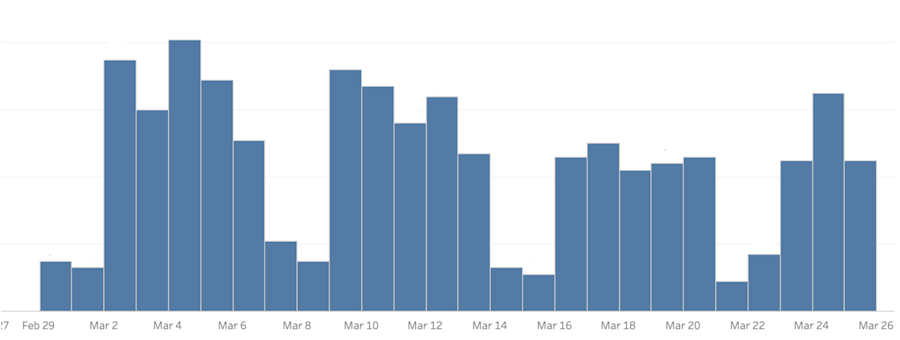
From the start of March, it was up and down.
The first of March, the 29th of Feb, was weekends. We don't invest too over the weekend because we're targeting B2B.
We find that during the week is when we do most of our lead generation. We see it being sort of up and down, but it's generally okay.
Then the 14th hit. This day here, the 14th of March, which is a Friday, a bit below the previous Friday.
On the 13th of March, Donald Trump announced that there'd be travel restrictions into the US. After that, we could see a sharp decline. You can see on March 15th, 16th, 17th, so on, we were stuck in a bit of a rut.
We needed to act quickly.
Now, this week, things are starting to make an incline again.
But how did we manage to get those things back on the up is how we reacted initially.
If I look at the 14th of March, this is a screenshot of a conversation that I had with Alex Olley.
Alex Olley is one of the co-founders of a company called Reachdesk.
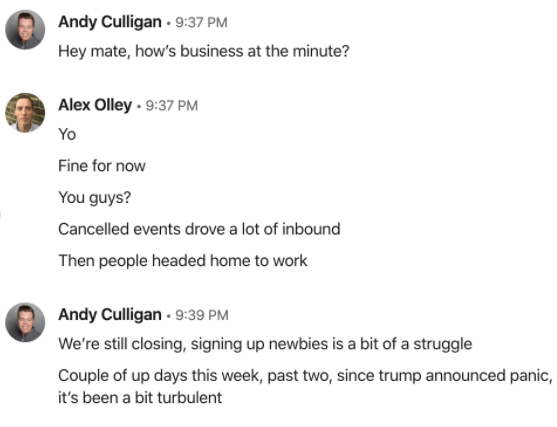
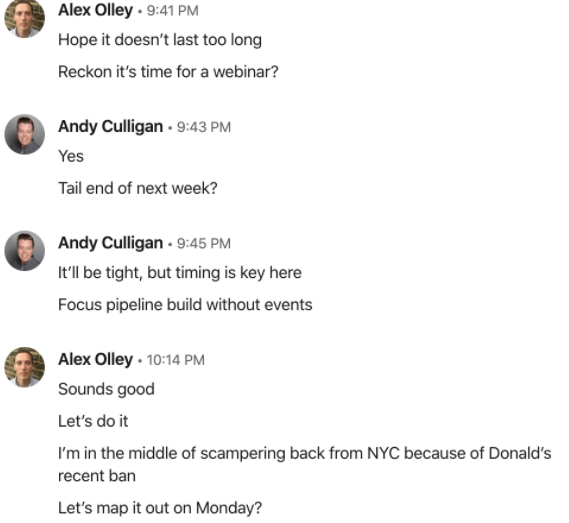
Anybody that was on our webinar last week would've known Alex. He co-presented the webinar that we did last week with me. They're a direct mail company. I've worked with Alex for many years with other companies.
He happened to be in New York, and he was trying to get back from the airport, and we were texting.
At 9:41 PM on a Saturday, myself and Alex decided that we'd do a webinar the following Thursday.
On Sunday, I pinged a message out to the team, said the following.

At Leadfeeder, we're a remote working company. I'm based out of Vienna in Austria, Anna's based out of the US, Daire is in Ireland, and Jonny's in the UK. But generally, most of the company works from home anyway.
But, let's see how we can get aligned on marketing campaigns done over the next couple of weeks.
On the 15th, on Monday, we decided to push the webinar. You can see that Jonny created a landing page, emails, and started pushing the promotion.
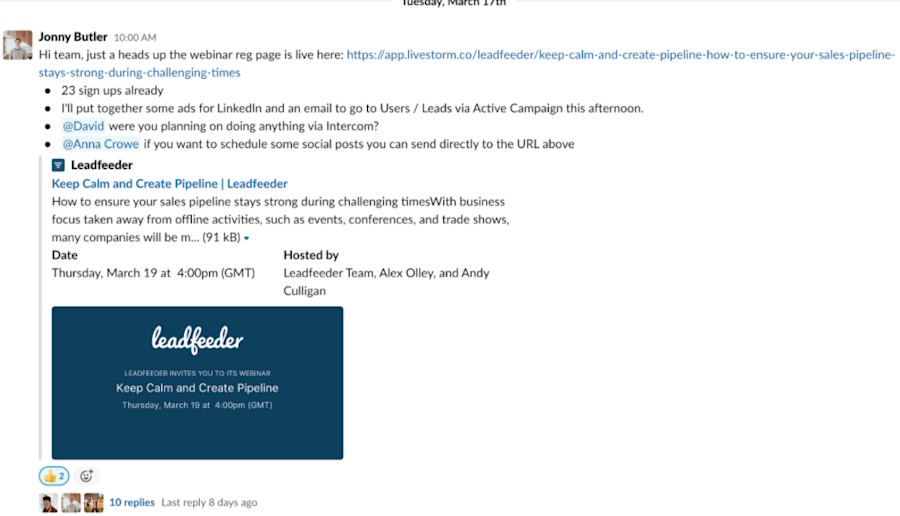
Five hours later, we've seen that there are 233 registrations.
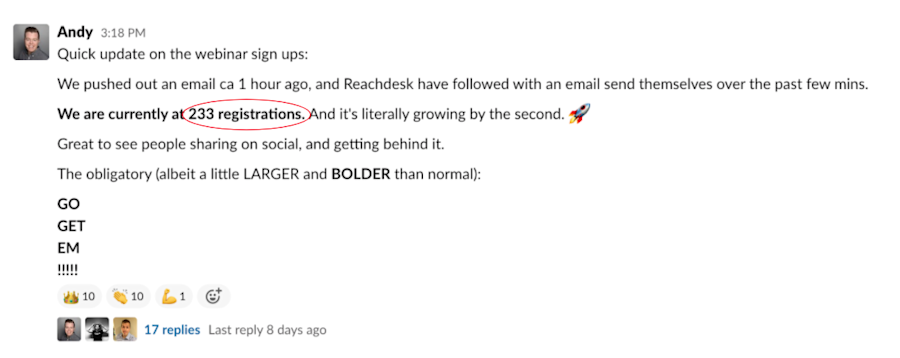
The most successful webinar that we've ever pushed. That is another indicator to us that people are dying to learn more.
At the moment, people are sitting at home. They're doing their home office. It's a time for research and time for a bit of self-improvement.
Last week, the webinar topic was around creating pipelines during these not-so-certain times. We gave people a lot of actionable information that they could take.
One day later, we see there are 430 registrants.

The previous evening, we were looking at about 200 less than that.
We kept on pushing and pushing and pushing.
We made a significant effort internally by getting our departments excited about it. And, we asked our team to share across their social media channels.
Then we ended up getting nearly 700 signups.
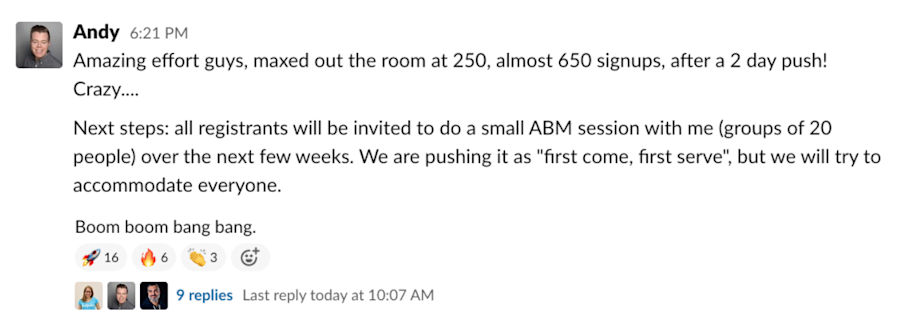
It was a very successful webinar.
In between, it's business as usual. We're not a huge marketing team.
Last week, the entire Leadfeeder team was supposed to be on our bi-annual team week retreat in Romania.
And, that was canceled.
I said, "Okay, well, let's get everybody together, and let's make sure we do some sort of team-building session."
That when we did a virtual team building session, which lasted about two hours.
We found out things like that Anna is quasi-related to the lead singer and violinist in Kansas. If anybody knows the song Carry On Wayward, soon you'll know who Kansas is.
But also in the midst of all this chaos and craziness happening in the world, we're still trying to move the needle.
On the one hand, we're jumping around, trying to make sure that we're reactive.
On the other hand, we're trying to keep the ship as steady as possible by still staying on top of the day-to-day.
This is important. It's important from my side, and I've also seen this in the team. But nobody's panicked.
Everyone's coming up with new ideas and saying, "Okay, can we do this?" We discuss it as a team. "Is this going to be possible? Maybe not. Maybe so. Let's try it. Let's see if we can push forward with it."
As Daire is going to say in his piece, it's essential that when you do these things, you just capitalize on it quickly. So move quickly.
If you look at the next day after the previous webinar, this is about moving quickly.
We sat together as a team that morning and decided, "Okay, well, look. This webinar is something that people are interested in. It worked well yesterday. So there's no reason for it not to work well again. Let's capitalize on that, and let's do another one next week."
We brainstormed for a little bit, and we spoke about, "Okay, what are the best things that could offer the best value to people?"
We said, "Okay, well, look. A lot of marketing teams at the moment are struggling with what to do next? Where should we be cutting budgets? Where should we be focusing our efforts on? What type of content should we be doing? What are the KPIs we should be looking at?"
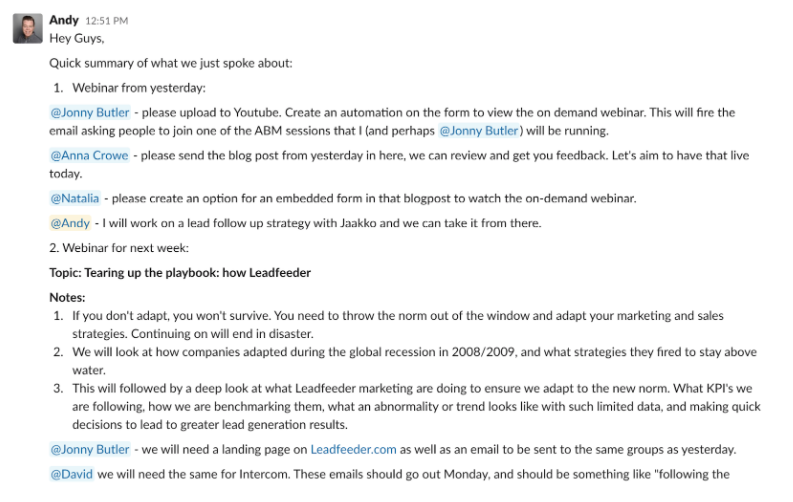
One of the critical things that I found is that the strongest pitch is no pitch at all.
At the moment, we need to be very wary of how we're approaching prospects.
The number one focus for the outreach should be, let's be willing to help. Let's figure out where people are having issues. Look to fill those gaps for people, but not from a monetary perspective.
In the long run, this will help because we've created connections. I wholeheartedly believe that in the long term.
People may not buy from you today. But, if you help people in an empathetic way that will pay off massive dividends in the future.
That's karma, right?
This is the only way that companies are going to win. You have to be patient, and at the same time, you also need to be empathetic.
With that, I'll hand you over to Anna. She'll bring you through what's changed from the SEO and content perspective.
Here’s how to adapt your SEO & content strategy during COVID-19
As you know, the coronavirus has been the most massive topic people are talking about for the past few weeks. And it's taking effect on search.
You can see from the chart below, the coronavirus is one of the most common search queries. It's even surpassing the most common and most consistent search queries like weather and news.
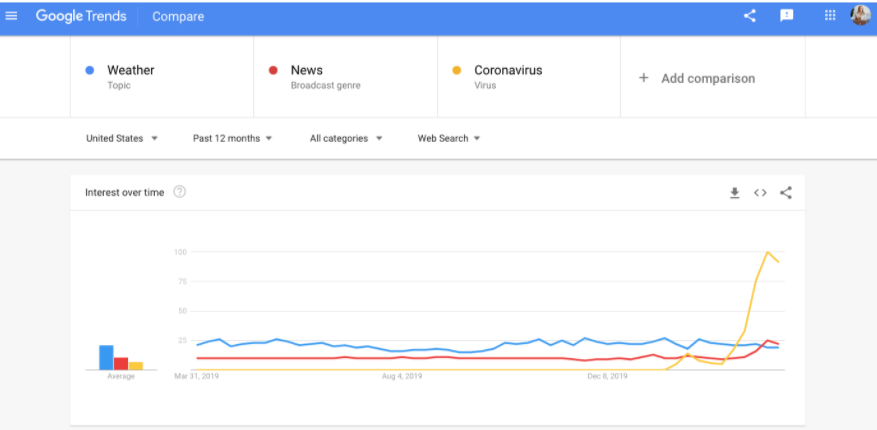
Companies have unexpected losses in revenue forcing them to trim budgets and maximize efficiency. While other companies are starting to see a large spike.
Zoom and Skype are two of those businesses. They've achieved their highest search interest for the last week. Skype grew almost 300%, and Zoom grew over 1000%, which is insane.
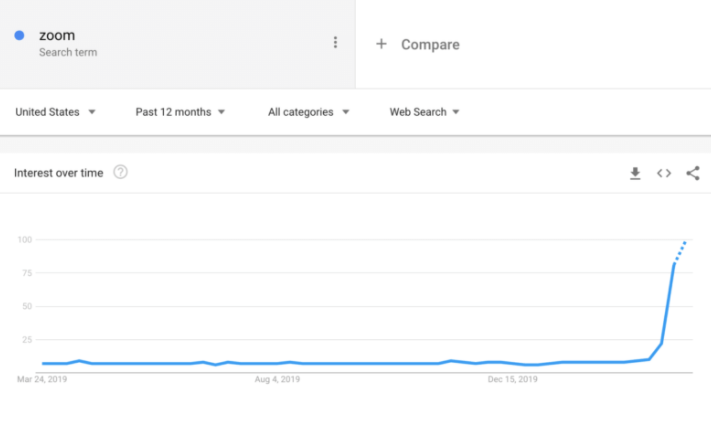
One of the big questions that I kind of see buzzing around in the industry right now, is how is coronavirus impacting SEO metrics?
The truth is it kind of depends on which industry you're in.
We know that search reflects human behavior.
Why?
No one lies to the search bar.
Before this global pandemic hit, searches like, "Why did I get married?" had over 40,000 searches monthly. Things like, "How do I use Google?" had over 1,000 searches.
We know that there's a person that lives behind every search query.
That search is driven by something. It's motivated by something.
For us search marketers, we need to understand that. We still need to speak to that motivation, especially during these times of crisis.
I'm using these search queries to start to identify patterns and trends. Then, I bucket these into interests based on our target audience at Leadfeeder.
For example, right now, we know consumer behavior is changing. People are shopping online. People are buying more household goods, and more and more are working from home.
It's no surprise that sites like The Daily Burn and Health.com are starting to see a significant spike in organic traffic. Here's a look at their organic traffic increases over the last two months.
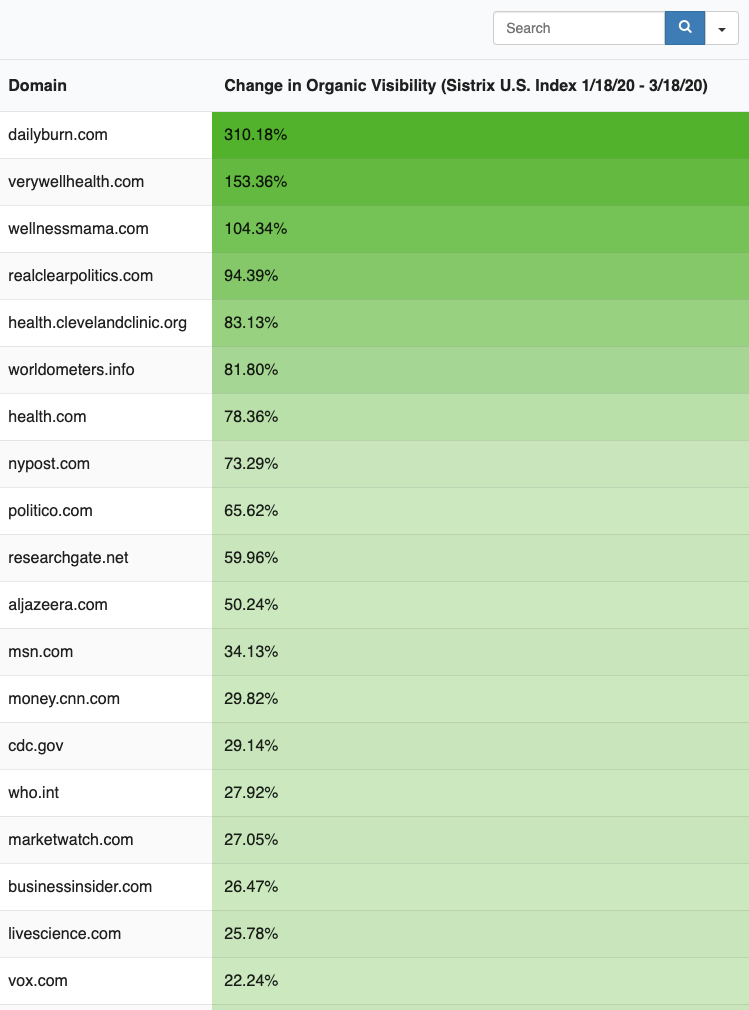
While other sites like Forbes are beginning to see a slight drop in organic traffic.
We also see search engines adapt to their different strategies. Bing and Google have both rolled out new interactive search results features, specific to the Coronavirus search.
And, different types at Schema have rolled out.
Schema like special announcements for things, like if your schools are closed or if quarantine guidelines. And, they have activated COVID testing facilities as well as an even attendance mode.
As Andy discussed last week in a webinar, we see a lot of events move from offline to online. Brands can use this Schema data to tell users that your event is now online.
Before you can start to shift your strategies, you want to identify why you're losing traffic. Is it because of the Coronavirus? Or is it because of a drop in your organic efforts?
At Leadfeeder, we started to look at Google Search Console to compare our impressions vs. our search queries.
If your impressions are dropping, but your keywords remain flat, that's most likely due to COVID-19. That's not a reflection of your lack of organic efforts.
Once search-demand returns, and it will, you'll start to see a drop if you take away those SEO activities.
SEO is a long-term investment. It's not a short-term game. Continue to move forward with SEO efforts even though you might be adjusting different marketing channels.
What does this all mean?
There are two important things we can learn.
1. Google might roll these out these new interactive SERP features across various industries later in the year or early next year.
2. Google appears to be focusing on the most trustworthy organizations to serve content. I want to point out one keyword here, trust.
Society is built on trust. It helps bind us together, but it also helps deal with our ability to predict the future. It helps us set expectations.
When someone enters a search query into Google, we trust that search engine to deliver trustworthy results.
In today's new normal, how do you establish trust with your content for search engines and consumers?
The answer is empathy. If your goal is to provide a fantastic experience to your customers online, then you have to make sure that empathy is everyone's job.
Empathy puts the trust back into your SEO focused content.
I'll show you a few examples of what that means.
Tip #1: Talk to your customers
The first thing talk to your customers. This could take many different forms.
Majestic, an SEO tool, published a blog post with a short statement acknowledging what they're doing and how they have been affected.
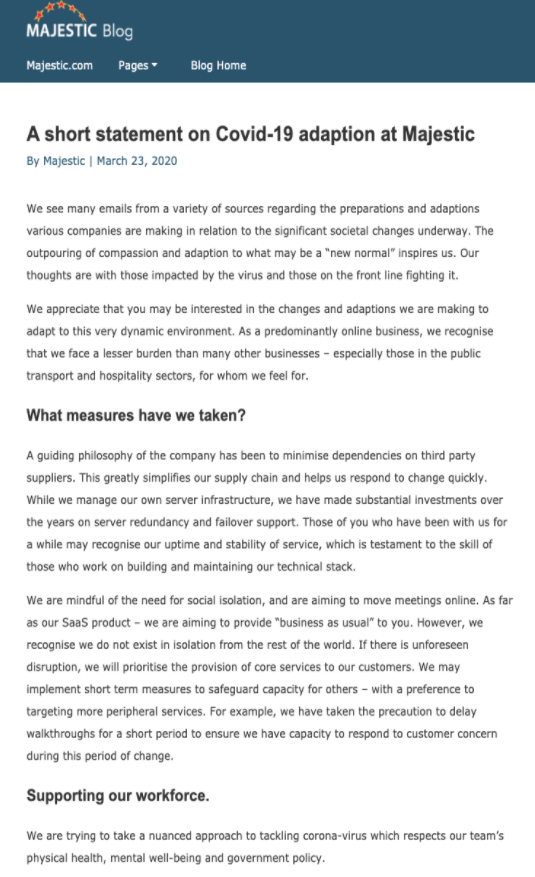
OkDork is another example. They sent an email to their customers. It wasn't a sales pitch. It wasn't an ask. They were genuinely asking customers to join them for lunch and do a little chat.
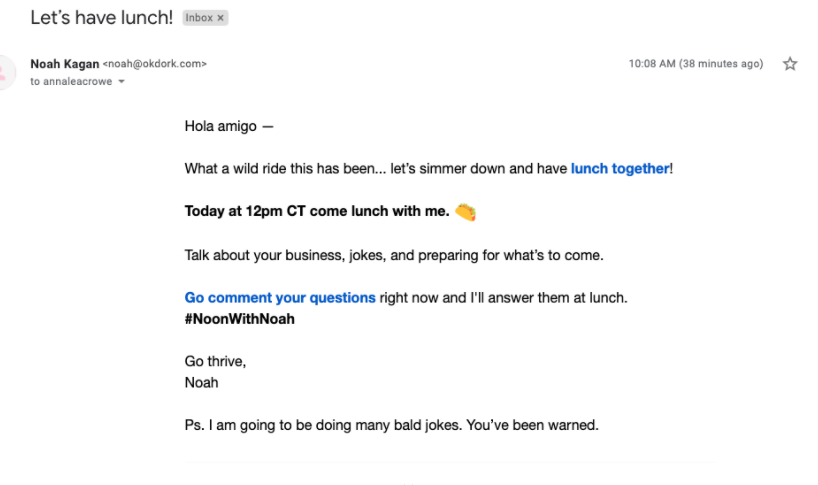
Andy and our friends at Reachdesk mentioned that they were doing this, too. Reachdesk is sending free lunch during that live chat or a virtual coffee event.
The one thing I want to point out here is you have to be sensitive during these times. You don't want to do this if this isn't impacting your business. For example, there have been a few trending posts on Twitter about how brands are missing the mark with their messaging.
One of the big ones I noticed was Taco Bell. Taco Bell sent an email to their customers, saying that they felt an obligation. I know I love burritos, and I know we have to save them at all costs, but I'm not sure if that was the right message to send.
Another one came from a makeup company. They were offering deep discounts. Again, I don't think that's the right timing for us to all come together about deeply discounted makeup products. You don't want to come across as insensitive during these super sensitive times.
Tip #2: Partner with other brands
Partnering with other brands can help expand your reach right now. Last week, we partnered with Reachdesk. We got almost 700 people to register using both networks.
Digital types of partnerships, like webinars, podcasts, blog posts, Instagram Lives, are becoming popular. Even music festivals are going digital right now.
Ellevest, a financial advising blog, they're hosting Facebook Lives with financial experts.
Get creative. Think about what your audience could use right now in their time of need
Tip #3: Adjust your message
Kevin Lee, Marketing Director at Buffer, shared how Buffer is changing their message on the homepage. They are creating that emotional connection with their customers.
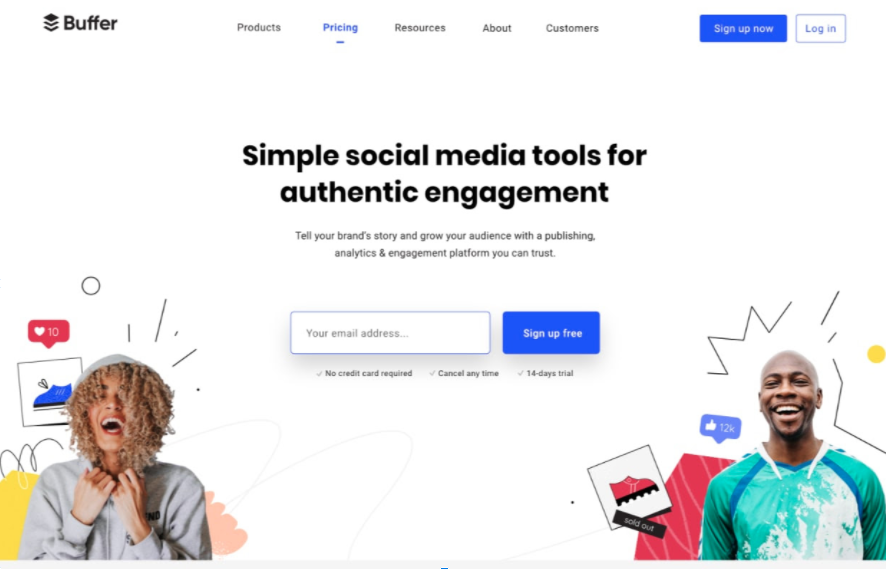
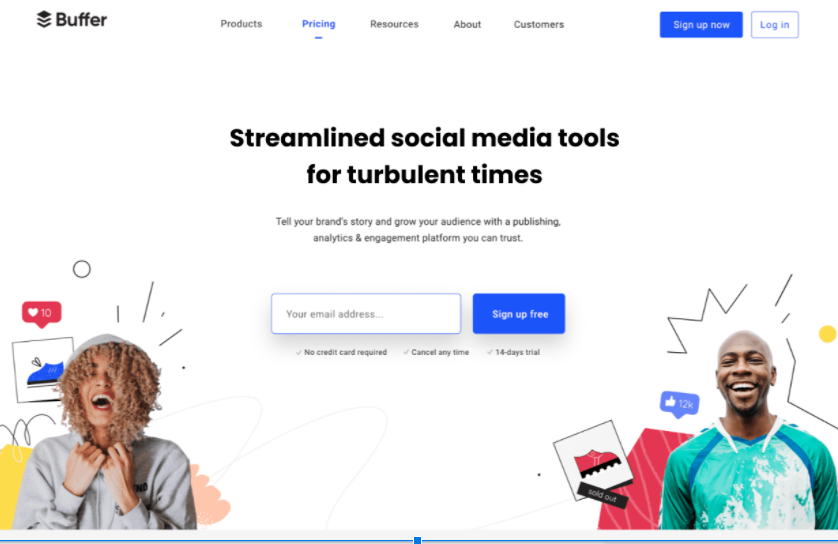
In the example below, you can see they are moving away from being so salesy to being more empathetic in their headline.
A little tweak to your marketing messaging changes can a big impact.
You can also use education and your tools.
Outlier, a business intelligence tool, is another excellent example.
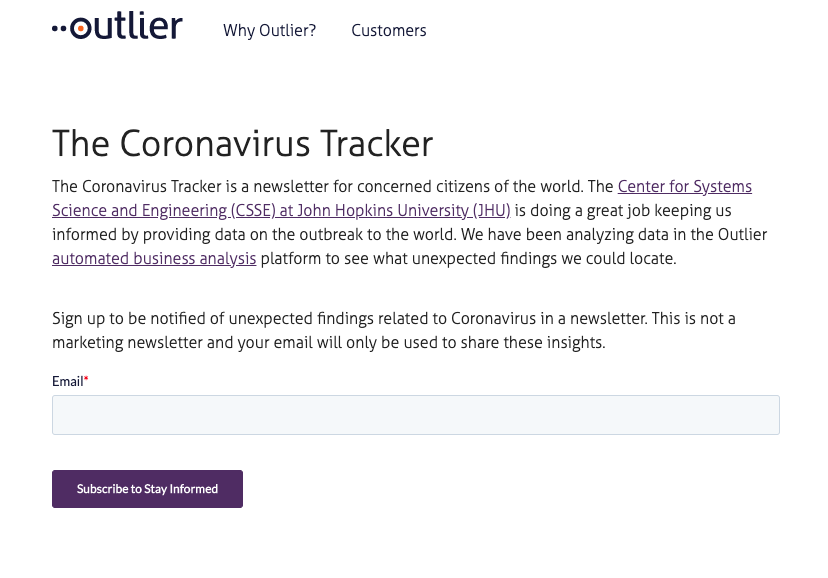
Outlier is using its software to partner with the CDC to track patterns and trends that are going on with the Coronavirus. They're using their AI technology that was not meant to be used this way to help expand and educate customers, not just their customers, but everyone.
Tip #4: Add value
As Andy mentioned, now is not a time to pitch; it's a time to give.
How can you add value to your customers in their time of need?
Reachdesk, another great example.
They are offering care packages with hand sanitizer. And, maybe a free lunch gift card. It's the little things that can add value and a memorable moment.
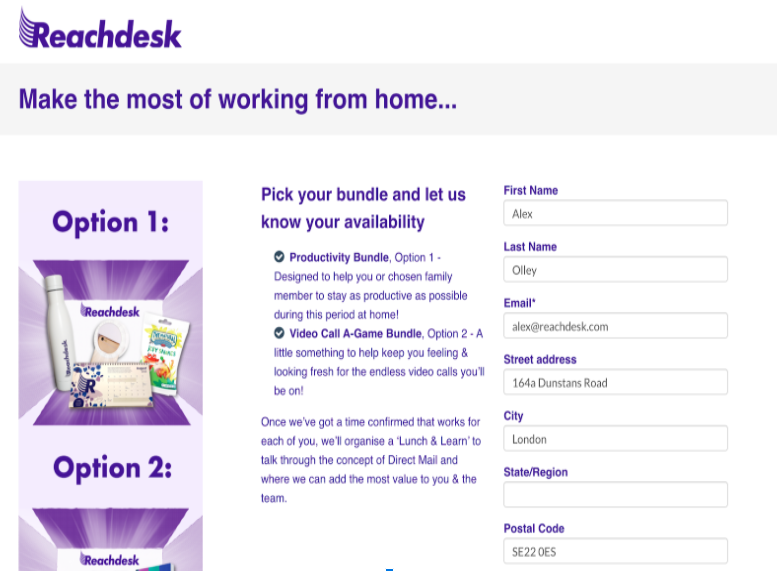
BombBomb is another platform that has opened up its platform free to educators. They know everyone's at home right now with the kiddos trying to homeschool.
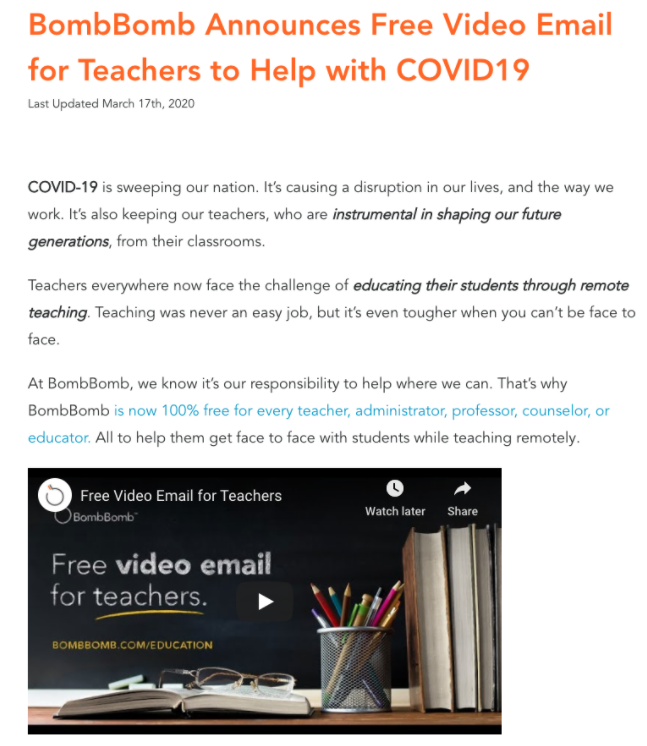
Empathy should always be a common practice, but right now, it's more important than ever. Empathy helps you understand your customer's pain points. It reveals different ways that you can create better content that improves your messaging and your product. We want to think about this as a short-term strategy, but for long-term engagement.
Here’s how to adapt your PPC strategy during COVID-19
Now, I'd like to introduce Daire to take over the next session on PPC.
I’m going to talk a little about how we adapt PPC in these challenging times. Short of what we considered certainties only a few weeks ago remains so today, and PPC is no different from that. What worked for you in the past won't work for you now.
People's habits have changed drastically in the last few weeks. Search and social media habits have changed, too. And your PPC campaigns must adapt to these changes, or they'll fall behind. I’m going to go through five simple ways you can adapt your PPC campaigns.
Tip #1: Speed trumps perfection
Speed is one of the most critical factors when it comes to changing your PPC campaigns.
And like most people these days, I've been watching a lot of news briefings. I was watching one the last day where the head of the World Health Organization's response to the Coronavirus. And he was asked, what the most critical factor is in the time of crisis? And I thought his response was exciting.
He said, "If you need to be right before you move, you're never going to win. Perfection is the enemy of good when it comes to emergency management. Speed always beats perfection."
And I think the same logic applies to your marketing campaigns.
Decisions need to be made faster with less data.
In normal times, like most PPC marketers, I'm very analytical. I'm sure the team will agree. It's very data-driven from our side, and I'm usually a big fan of this approach, but in these challenging times, tests are less useful.
The time taken to run a successful AB test would be valuable to adapting. You don't have the time to wait for a successful experiment to run. Decisions need to be made on fewer data in shorter periods.
Typically, at Leadfeeder, we'd run a test over a month to get a significant level of data. We don't have that luxury at the moment. Even if we did have time to run that test, people's habits are changing so fast, so what worked a couple of weeks ago won't work now.
You have to trust your instincts. Monitor a few key metrics on a daily. Then, react based on your instincts of what you see changing. If you see hesitant buyers, if you see a drop in conversion rates, if you see a decrease in search volume, you're going to need to react fast to stay relevant.
Tip #2: Cutbacks that don’t impact growth
In a lot of companies, paid marketing can be one of the most significant expenses outside payroll. In challenging times when belts are getting tightened, it's usually one of the first ports of call.
It's likely a lot of people on this call have already come under pressure to reduce their spending.But like a lot of upper-level management, they like to try to throw in the caveat without impacting growth.
What if the solution could lie within your best performing campaign?
Brand campaigns
Many brands invest in their brand Google Ads campaign. These campaigns often produce a lot of conversions at a very low cost per acquisition.
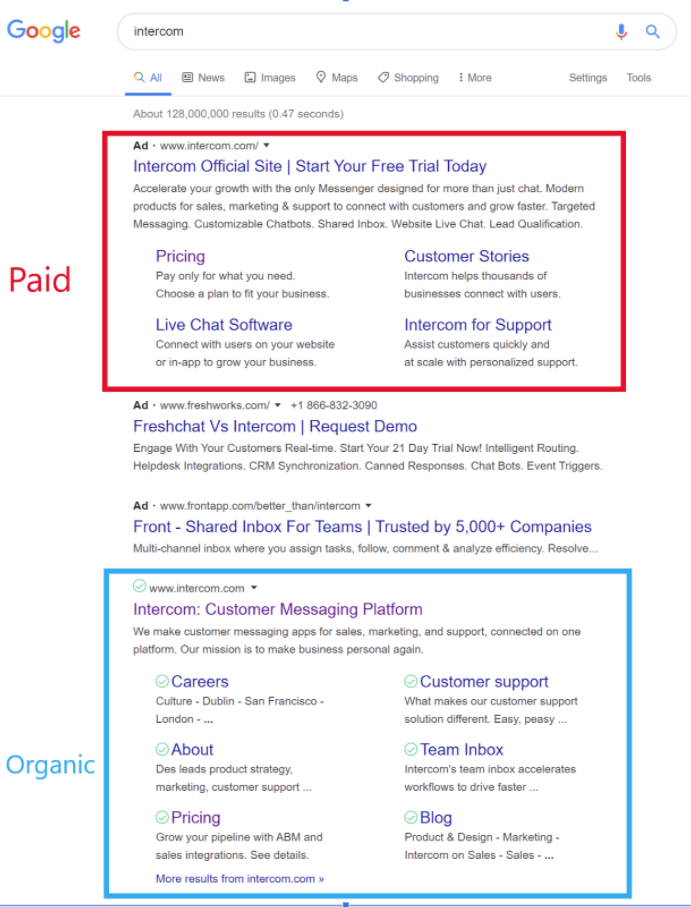
But actually, what is the real impact of these campaigns? What percentage of these conversions would you get for free via organic if these ads weren't there? And what percent is incremental?
If you truly measure the impact of these campaigns, you should only count the incremental conversions as the impact of this campaign.
One of the benefits of these challenging is that companies are more open to making changes like this than they would be in normally.
Now is a great time to propose a move like this and see what the impact of these campaigns is.
We've been testing this out at Leadfeeder. It varies for every company, but we only see that 15% of these conversions are incremental. The other 85% we would get anyway via organic. You need to do it for your brand because it varies a lot by industry. It's a creative way of thinking of reducing your spend without having too much impact on the number of conversions and sign-ups.
Tip #3: Target growing industries
This crisis hasn't impacted each industry in equal measure. While industries like the travel and hospitality sectors are getting hit very, very hard, there are other industries like healthcare, medical devices, online learning, productivity software, even hardware stores that are seeing significant growth.
If your product can offer a solution to any of these industries, you should start moving your marketing budget across to target these industries. If you're going to be targeting travel, at the moment, you're going to have a tough time because they just don't have the money to be spending.
Whereas if you target these growing industries or even the ones that are reasonably stable, you're going actually to see a lot more return on your investment.
It seems like a simple step, but actually, how many people have made a change, where they start targeting the places that are seeing the most significant growth at the moment.
Tip #4: Deliver more for less
Delivering more for less is always a good idea when it comes to paid marketing, but it's even more critical now.
With all events being canceled or moved online, most sales teams are crying out for more leads. And they have a lot more time now to be following up on leads that are less qualified than before.
If your PPC campaigns can deliver additional leads at no extra cost, you'd be in a stable position to keep the campaigns running.
And this can be done in several ways. You can look at ways of lowering your lead scoring thresholds, changing your conversion actions, so it doesn't require as many details.
At Leadfeeder, we like to use our products to do this. With our product, you can see all the companies that are interacting with your campaigns that don't convert.
And if we see companies that are showing a lot of engagements that are within our ideal customer profile, we automatically send these to our CRM with an open task for our sales team to follow up with a demo or to reach out to these people, to see if they're interested and want to learn more about the product.
This is a way of getting more leads without any extra marketing spend. The example we're showing here on this below is actually from one of our campaigns.
We see Roche, a medical device company, that is interacting with a lot of our content at the moment.
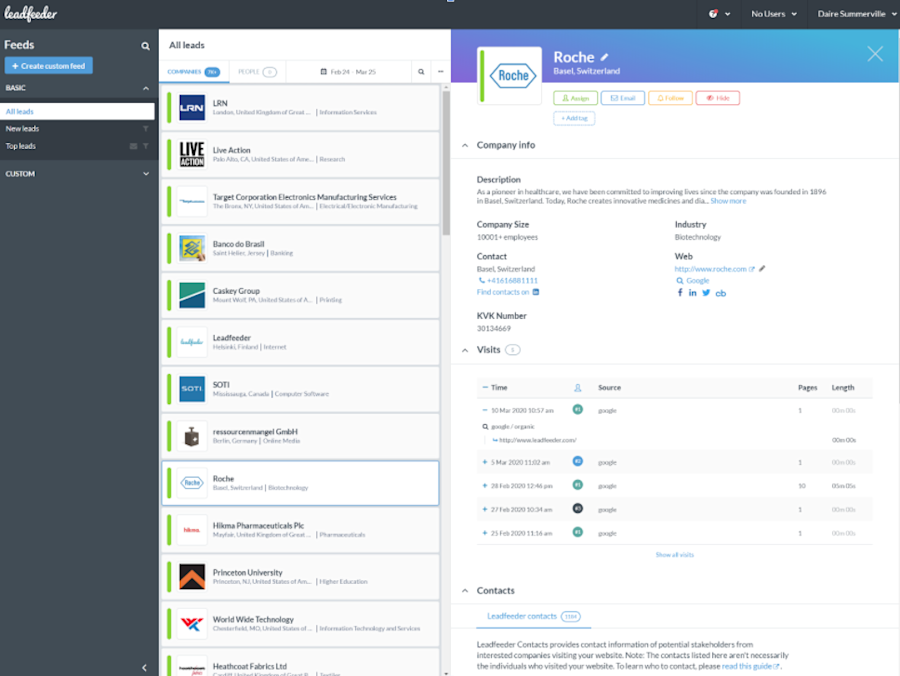
And there are many people in the company spending a lot of time looking at our product. They fit into our ideal customer profile at the moment. And, they're not impacted too much by what's happening at the moment.
We would pass this across to our sales team, and they can start to follow up with them to see if there's anything that they can help them out with.
That's just another idea of how to deliver more for less, and not spending any additional marketing spend, but producing more leads for your sales team to follow up with.
Tip #5: Focus on ROI rather than CPA
For a long time, the focus of PPC has been on conversions and the cost per conversion. But under this approach, every conversion is assumed to be of equal value.
And we know in a lot of businesses, this just isn't true.
There can be considerable variations in the value of one potential customer and another one. It's about time our paid marketing efforts should reflect this.
This is also a tremendous change to your campaigns. It's a good time now to make these changes, that you set yourself up for future growth.
Most companies currently use a bidding strategy, which gives the ad platform the flexibility to bid more for users who are more likely to convert.
So that the likes of Target CPA or Enhanced CPC, if you're on Google, they're examples of that sort of strategy.
The next kind of step onwards from this is to move on to a bidding strategy that has not only the flexibility to bid higher based on their likelihood to convert, but also on the potential value of that customer to you.
You can bid more for customers that are higher value and may bid less for ones that are lower value. This makes a lot of sense in practice, but it hasn't been done too much up until now.
It's available already in both Google and Facebook.
It uses the revenue figures, to determine which campaigns are producing the best return. Then, it moves the budget to the ones that are generating the best ROI.
It's a significant mind shift for people in the marketing team. You have to think of returns more from a sales point of view, in terms of what are the potential revenue, rather than the number of conversions.
We're very used to reporting on the number of conversions.
Under this approach, you start reporting on the actual potential revenue that the campaigns are delivering. This is a significant change to your campaigns, but it's an important one, and it would set you up for a lot of future growth. It's an excellent time to make a change, like this at the moment.
Summing all that up, speed and efficiency are the keys at the moment, to PPC, in these challenging times.
You need to react fast to stay ahead. So I'll pass you across now to Johnny, who's going to talk about ABM.
Here’s how to adapt your ABM strategy during COVID-19
Before I talk about what I've been focused on for the last couple of weeks, I want to give a quick overview of what account-based marketing is.
Account-based marketing flips the typical inbound marketing funnel on its head.
Here is an example of an ABM marketing funnel vs. an inbound marketing funnel.
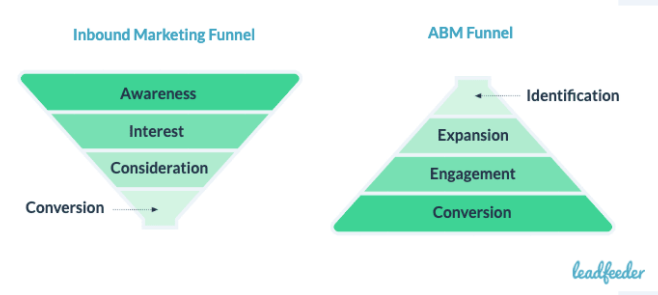
Things like SEO and content marketing drives high volumes of traffic to your website. Then, you have a lead capture process, where people download ebooks, you collect their information, and then you use the information you collect, to start qualifying them. Next, you find the right people to become customers, forcing them to your sales team.
Account-based marketing flips on its head. You're identifying your ideal targets beforehand. Then you're starting to run campaigns to target those people directly.
ABM is about focusing on a smaller pool of higher value clients.
With inbound marketing, you're looking at a much larger pool of low-value clients. Then, looking to whittle them down to the ones that are relevant to you.
That works by identifying your target accounts, using your ideal customer profile, which is based on firmographic data, revenue, data, tech data, etc. You define by persona, so this is the buying committee at those companies that your sales team wants to talk to.
Then you create economy messages for those personas and account types, and you look to engage with them on specific channels.
This doesn't have to compete with inbound marketing.
Both of them complement each other quite nicely. Your inbound marketing is focused on, as I said, those lower value prospects, and your ABM is focused on the higher-value ones.
The critical thing about ABM is that what you need to do with it, is aligned very closely with your sales team. We're trying to do with our account-based marketing campaigns, is build a robust high-value pipeline for the sales team. Then, help them progress it, and towards a sale.
What are we looking at, and what are we tracking?
At the campaign level, we're looking at typical campaign metrics, conversion rates, cost per lead, stuff like that.
At a higher value, we are looking at our overall account-based marketing program, the amount of revenue that we've closed. And we look at the projected pipeline value.
Over the last couple of weeks is on a low level, like a campaign level, when we are running, for example, lead generation campaigns on LinkedIn.
The actual cost per lead has come down slightly over the last couple of weeks. And that could be an indication of what we've talked about already.
What Anna and Andy have both touched on, is this thirst for educational content.
A lot of people are being thrown into a situation where they're having to launch new strategies, do things which they've never done before to try and plug some bleeding within the company, and they've got to figure out how to do this. People want educational content right now.
At a high level, account-based marketing campaigns, as we're dealing with enterprise clients. We're talking about months rather than days or weeks to close.
So how exactly that's affected our pipeline right now, we can't see it as numbers within our pipeline right now. So we had to figure out another way to see how this is affecting us. So what do we do next?
The single best thing you can do is talk to your sales team.
There's not a massive amount of data out there at the moment. I found this survey by Bravada, which is a social network for B2B salespeople. Bravada surveyed, about 134 sales executives, to see how coronavirus is affecting them.
48% of people say it's harder to contact decision-makers.
41% of people saw it as saying that, deals that were nearly closing are being pushed, new opportunities are slowing down.
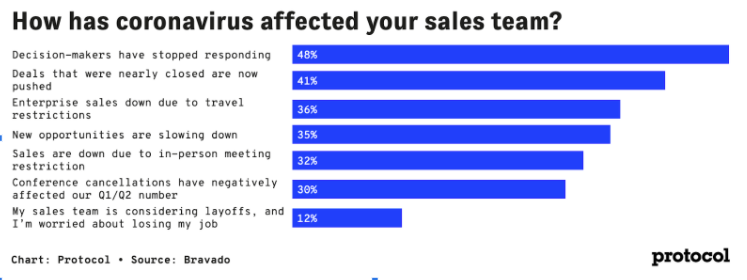
And if you go and talk to your sales team, depending on what industry you're in obviously, you'll probably hear something similar.
So talking to our sales team, we see there's still plenty of clients we're talking to, who are ready to buy, looking to close. But there's also plenty that are displaying a little more caution right now, and they're pushing back buying decisions. Maybe they've had budgets been frozen.
There's a likelihood we'll see that Q1 will stay on track as we're basically at the end of Q1, but Q2 we'll see some impact from this drop off in our pipeline.
How does it impact our spending?
Well, firstly, one thing to do is, is keep an eye on your spend, and your pipeline length. With that, that set of targeted accounts we're focused on, what we'll have done is tier them based on their potential revenue for us, as customers for us.
And then we'll have worked out different customer acquisition costs based on those revenues. We want to talk to our sales team to try and understand if we've had a tier-one client that we know is worth a certain amount of money to us.
We are willing to spend this amount of money over a three-month pipeline, if that's been extended to four or five months, we're going to have to make that budget last a little bit longer.
But overall, what can we about it?
I'm echoing what we've already spoken about here. We want to do is continue to engage our targeted accounts.
When those target accounts aren't looking to buy yet, it's still imperative that we stay in contact with them. So Anna's already spoken a ton about creating content, focused on empathy and education.
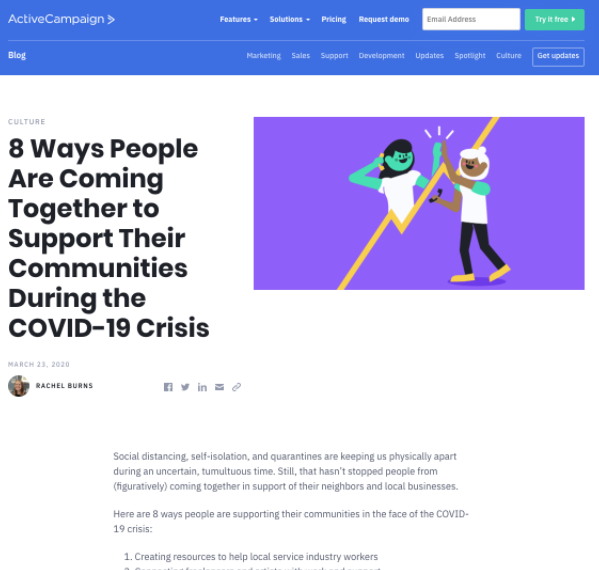
And that's honestly, our job here is to take that content and make sure we're getting it in front of the right companies. Like these high-value potential target accounts, we need to get the content in front of those that are going to count to us.
How do we do that?
What we've got to do here is, this is really about alignment between sales and marketing, and that's what account-based marketing as a whole is about.
The first thing here is to make sure our sales teams maintain one-to-one contact with our targets.
One of the first things I've done is, try to collate all the content we have, that are going to help people during this period, and make that available to our sales teams.
Putting it in shared drives, sharing it with them in Slack, and saying, this is all the content we'll need to be sharing with your target accounts right now. It's going to help them get through this, and help them continue to create pipeline and generate revenue.
Instead of picking up the phone, say for the sales team and chatting with a target account and hearing that they could have a freeze on spending for a couple of months, instead of being a situation where it's like, "Okay, I'll put a task to give you a call in two or three months time," the sales team can continue to stay in contact with them over the next three months, continue to drop them one to one messages, continue to say, "Hey, here's our latest ebook," or "We've got this webinar coming up next week. I think it's going to be relevant to you."
And continue to maintain and support them during this time, when they're trying to figure out what to do.
And in addition to that one, one other thing that the sales team can do is to continue to engage with those accounts based on how they browse our websites.
Within Leadfeeder, for example, we can tell the companies that are visiting your website, we can create feeds based on specific pages they visited.
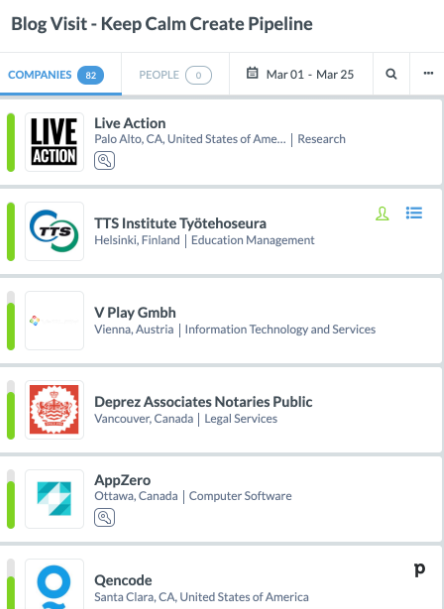
Here I've got a feed that I created called blog visit, keep calm create a pipeline.
This is a blog recap of the webinar we ran last week, and this is telling us all the companies that have visited that blog, and have read that blog.
Then, the sales team can do is they can connect these companies here, with the corresponding company on the CRM.
Then that visit data can get sent straight to the CRM, and then when the sales team are checking in on their accounts within our CRM, they'll get a list of all the pages and blogs that have been read on a website, and they can use that as a trigger to reach out to them.
If they've seen that a potential client has read this blog about creating a pipeline, they can follow up with an ebook that's associated with it and say, "Hey, here's an additional piece of content that might be helpful to you."
As a marketing team in terms of what we can do to support the sales team, one thing that will work well here is account-based retargeting.
So what I can do with this customer feed I've created in Leadfeeder from everyone who's visited this blog is I can export this as a CSV.
I can then upload that to a matched audience account list on LinkedIn. And I can run campaigns targeting the companies and people the companies serve, who have visited this blog.
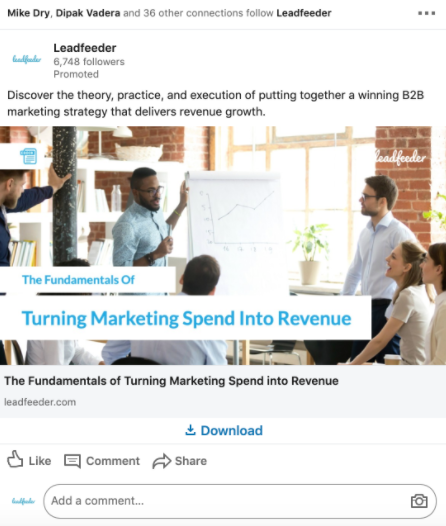
For example, say our buyer persona is, we want to target marketing managers or marketing directors. I can target all the marketing managers and directors at these companies, with an additional piece of content that I think might be helpful to them.
In this case, we're running an ad campaign pushing our ebook about how to turn marketing spend into revenue because it's an additional step from that, how to create pipeline during a time like this.
What's the goal of all this?
At a top-level, we're a business, we'd love to still close deals and make money. So would everyone but we're very aware that's not what a lot of potential clients are in the space to do at the moment.
Well, a lot of potential clients are in the space to do it at the moment. Our primary goal here is to build stronger relationships with our clients or potential clients.
If we can help them get through this successfully and we can support them, then if we've done our job correctly. We've built this stronger relationship with them.
Then when they're ready to start spending again, in maybe a couple of months or three or four months, however long it takes.
We should still be there to help them, and we'll always be there when they're making that buy decision.
If we've done it well, we'll know them better as a target account. They'll remember us better as a service. Then we'll look to maintain and even grow our pipeline and put ourselves in a powerful position for a few months.
Wrapping up
It's a tough time at the moment. We're in the midst of a recession.
We don't know which way it's going to go. It could be fine. It's looking like a won't be, though.
Within these tough situations or these tough times, there are always companies that make it through. And if we look at the companies that came through in tech during the 2008, 2009 recession, which was the most significant recession in a long, long time.
We've seen massive companies come out on top such as WhatsApp, Slack, SendGrid, Stripe, Airbnb, Uber, so there's plenty of opportunities.
Within tough situations and challenges always remains a possibility. It's still work bearing that in mind. Those who will win will have done things differently.
So, why did these companies win?
It's because they adapted to their environment. They gave products that we're filling a need within the market. They were also changing their messaging to represent filling that specific need, et cetera, et cetera. It's about how we move now, as marketers.
And how we adapt to the current environment around us, which is going to be necessary, while at the same time keeping an eye on the day-to-day.
It can be challenging to try to counteract or to jump on things that are changing, as well as trying to stay on top of the day-to-day without going crazy. As marketing leaders, my suggestion would listen to what your team is saying.
Trust that your team is making the right decisions.
Note: Want to gather buyer intent data and signals out of your own website to understand your visitors more? Sign up and try Leadfeeder free for 14 days to uncover the companies that visit your website, plus details on how they interact with your site.
More leads, no forms.
Sounds too good to be true? It’s not. Identify companies already visiting your website and turn them into qualified leads to fuel your sales pipeline.
Show me how
![How to Keep Calm & Create A Pipeline During COVID-19 [Webinar Recap]](http://images.ctfassets.net/plii0v5gbc4s/PMKzLjKllGhfTMhotAfbO/433c75d1e9cea0c049b88b911538bef9/coroanvirus-sales-pipeline-header.png?w=686&q=80)





